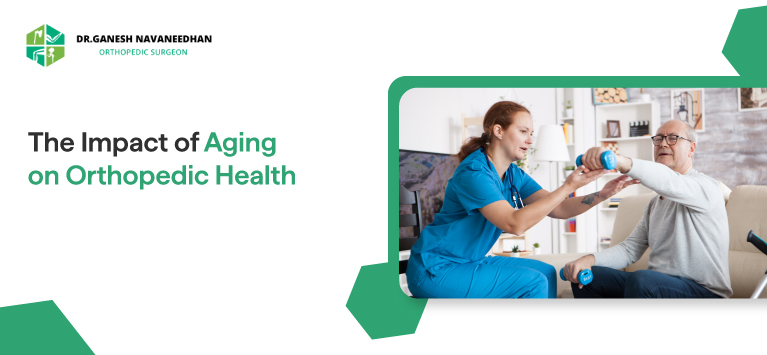- +91 62384 78716 +91 99475 78797
-
Sasthamangalam, Trivandrum
Sasthamangalam, Trivandrum
Table of Contents

Aging is an inevitable and natural process that affects all aspects of our lives, including our orthopedic health. Our bodies undergo physical changes as we age, making us more susceptible to orthopedic conditions and injuries. Age brings about a multitude of changes in our musculoskeletal system. Understanding these changes can help us better care for our orthopedic health as we age. So, let’s look at how aging affects orthopedic health.
Table of Contents
Orthopedics is the branch of medicine that prevents, diagnoses, and treats musculoskeletal disorders. These disorders include conditions related to our bones, joints, muscles, ligaments, and tendons.
Aging brings about several changes to our musculoskeletal system. These changes include a loss of bone density, decreased muscle mass and strength, reduced flexibility, stiffening of joints, and declining ability to heal after an injury. These alterations make us more vulnerable to orthopedic issues like fractures, arthritis, and tendonitis.
These changes in our musculoskeletal system can significantly impact our daily lives. Common effects include:
While the aging process is inevitable, its impact on our orthopedic health can be mitigated through proactive measures. Here are some key strategies:
Maintaining a positive attitude and engaging in enjoyable activities can significantly impact your well-being. Social interaction, volunteering, and pursuing hobbies can reduce stress and improve mental health, which indirectly benefits your physical health.
Our bones and muscles might be affected as we age, but it doesn’t have to complicate life. If we eat well, keep moving, and see the doctor when needed, we can stay healthy as we age and avoid unnecessary bone and muscle problems.
Consult a doctor for persistent joint pain (lasting more than a few weeks), significantly if it worsens with activity, hinders daily activities, or is accompanied by swelling, redness, or warmth. Seek medical help if you experience reduced mobility, such as stiffness, difficulty performing everyday tasks, or visible deformity in a joint.
Seek medical help for significant muscle weakness, frequent falls, or feeling unsteady on your feet. Additionally, consider consulting a doctor if you have a family history of osteoporosis or other bone diseases, chronic conditions affecting bones and joints, or recent fractures or injuries.
Early diagnosis and treatment can prevent further problems and maintain your quality of life.
Knowing how aging affects your bones and muscles helps you choose wisely and act early to keep them healthy. Adopting a healthy lifestyle and getting expert advice will help you handle these changes with strength and grace, ensuring a lively and active life as you grow older.
Copyright © 2025 Dr. Ganesh Navaneedhan. All Rights Reserved. | Designed By Harvee healthcare